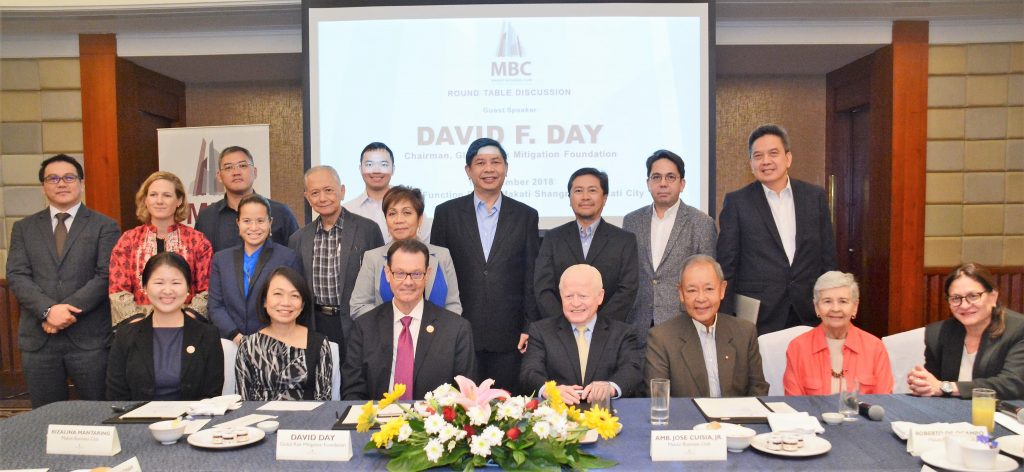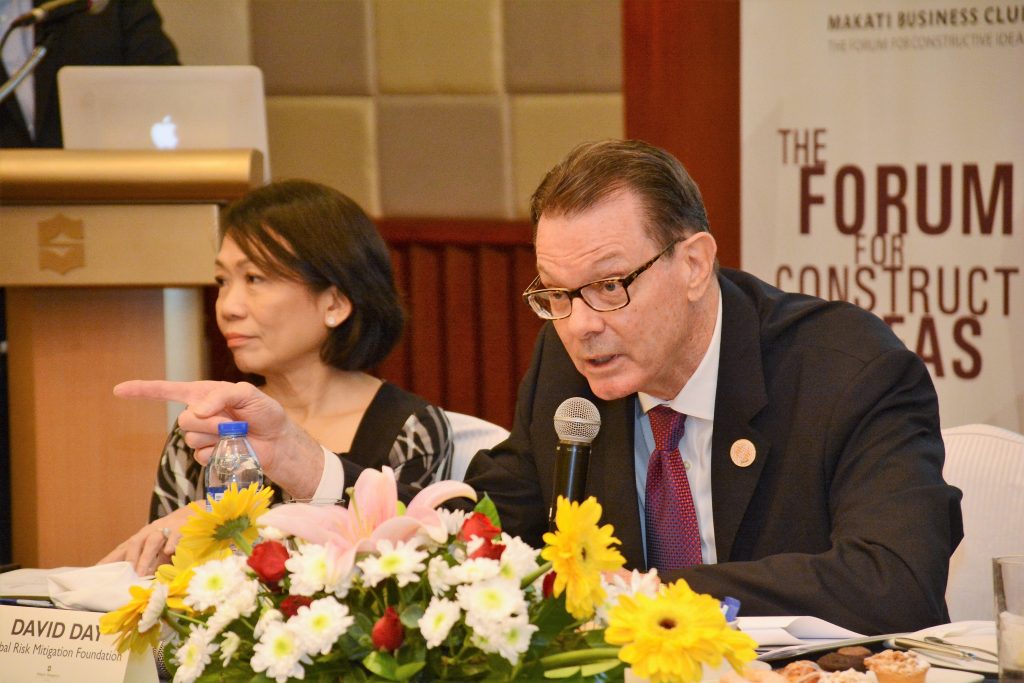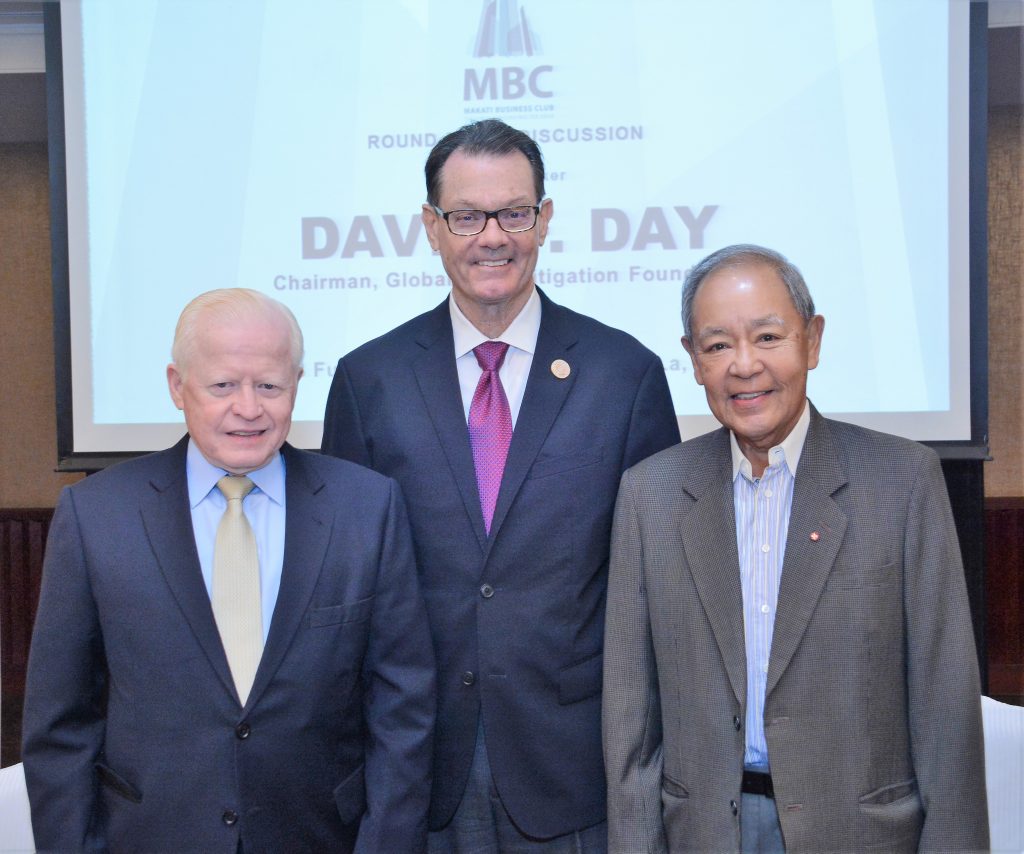
12 December 2018 – International legal expert David Day raised three key considerations in understanding the risks posed by the ongoing tensions between the United States and China – what are we overestimating, let us not underestimate the situation, and what is it that we don’t know.
Mr. David Day, the founding director and Chairman of the Global Risk Mitigation Foundation, was the speaker today at the special roundtable hosted by the Makati Business Club. He shared his own assessment on the current geopolitical situation – the US-Philippines relations, the trade war, the US pushback, and then the China situation that cuts right through the internal challenge with the Marawi situation and the risks that are present in the area in Mindanao – and highlighted the potential risks and opportunities for the Philippines.
He started describing what has happened to the US-Philippine relations that must be understood. He noted the harsh words exchange by President Rodrigo Duterte which he believed that some of those words were actually “carefully earned” by the United States. Example was that the US did nothing to help in the Hague Arbitration Tribunal proceedings, nor did it showed support for the country when the Tribunal rendered its decision. However to Mr. Day, these were just hairline cracks in the very tight relationship between the US and the Philippines that he likened to a family.

On the US-China trade war was about two tariff lines, one which relates to national security and the other about unfair trade practices. The US started out with tariffs on refrigerators, washing machines and solar panels from China, then to broader tariffs on aluminum and steel products, and from there to other goods. These sanctions has been aggravated by the realization of the multi-billion issue on intellectual property theft, the discovery of which ran against China’s goal of becoming the technological superpower by 2025.
With regards to the Trump-Xi announcement of a 90-day “temporary truce”, what was import to look at would be what would happen in March 1 when tariffs on Chinese goods would go up to 25% from 10%. The ramifications of the tariff increase on the Chinese economy would be enormous. US companies were advised to audit their supply chains to get non-technical Chinese products out of their businesses. Mr. Day in turn advised that Philippine private sector could actually fill in those areas.
As it remains unresolved or further escalates, there could be more opportunities to seize. Thousands of business would be going out of China, including even many Chinese companies and they would looking at their new destinations, particularly in Southeast Asia. Viet Nam has been getting considerable amount of investments, and the Philippines should also be able to grab a significant share.
Another great opportunity for the Philippines is the newly created US International Development Finance Corporation. With an initial funding of $60 billion, it was intended to encourage US private sector to engage with developing countries. This would be a powerful development tool which the companies in the Philippines could take advantage of.
The Philippines, on the other hand, is deepening its relations with China evidenced by the growing number of joint projects in infrastructure, mining, and maritime research, to name a few. Mr. Day cautioned the Philippines against the debt trap situation for its infrastructure loans, stating the case of Sri Lanka as a prime example. That said, he believed that with the right safeguards, there would be successes in the Philippines engagements with China.

Meanwhile, among the undertakings he cautioned against was the case of the rehabilitation of Marawi. He noted that the Chinese state owned enterprise as potential contractor for the Ground Zero reconstruction. There were also Chinese construction firms that were sanctioned by the World Bank. Further implication of these movement in Mindanao was its potential impact on territorial waters and resource extraction in exclusive economic zones. This would have potential for adverse spheres of influence in the Philippines and the greater threat of terrorism and the security in the region. Thus, Mr. Day emphasized the importance of Marawi situation and the Philippines in these regional strategic policies especially with the new US Indo-Pacific strategy.
In its efforts to bring global affairs closer to the Philippine business community, the Makati Business Club has been closely following the dynamics of the US-China relations. Last February, MBC had Secretary Ernesto Pernia of the National Economic Development Authority discuss the Philippines’ prospects from the One Belt One Road. Vincent Lo, Chairman of the Hong Kong Trade and Development then was the guest speaker in the Club’s membership meeting in April saying the country has to have a strategy to be part of the mutli-trillion-dollar Belt and Road Initiative.
